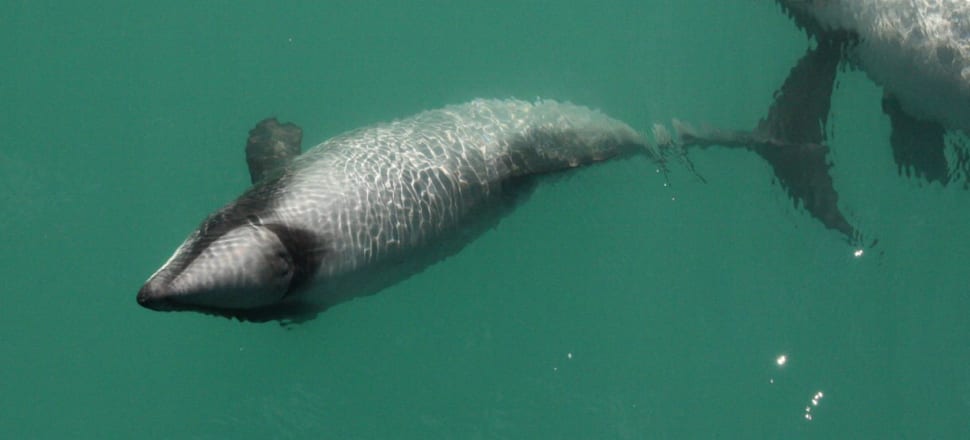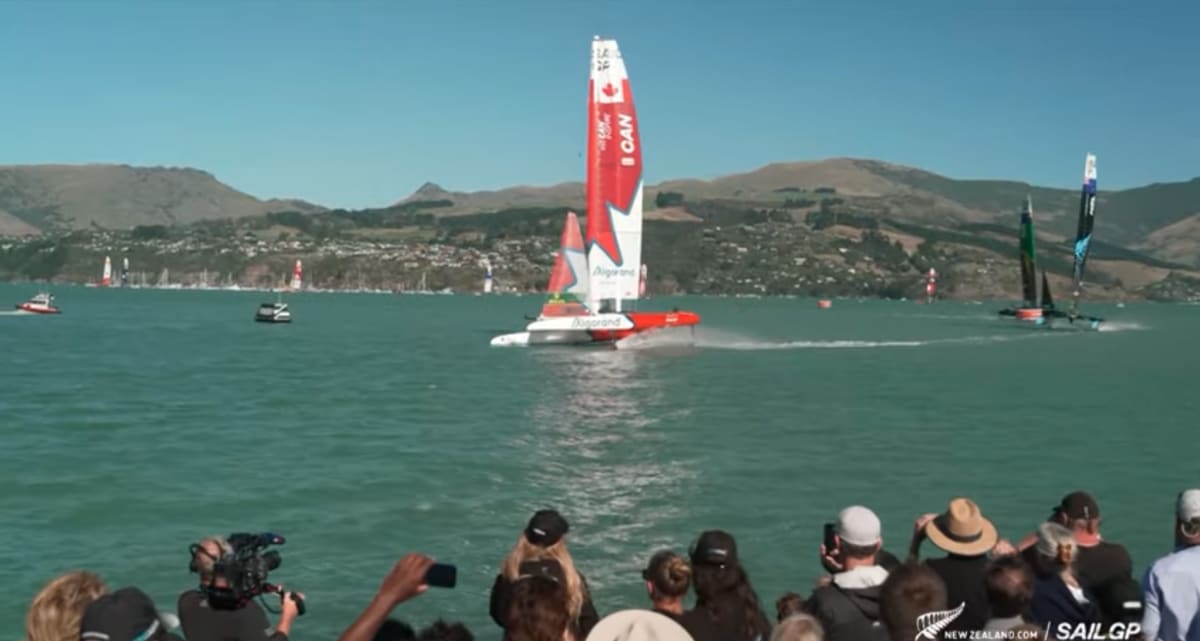
Skippers and race controllers weren’t interviewed as part of a DoC investigation into March’s SailGP race. David Williams reports
Fresh details have emerged about a Department of Conservation investigation into SailGP, as dolphin advocates and city councillors weigh in.
The international sailing series’ inaugural New Zealand race was held on Whakaraupō/Lyttelton Harbour in March, with super-fast catamarans scything through the water in front of 15,000 fans, and footage beamed around the world.
READ MORE: * SailGP ignored order to halt Lyttelton race * Conservation department confirms probe into SailGP race
The racing area is part of the Banks Peninsula marine mammal sanctuary and home to nationally vulnerable Upokohue/Hector’s dolphins.
Event organisers monitored for dolphins, including via land- and water-based observers, and adopted a management plan, with input from scientists and iwi, laying out how to respond if dolphins came too close.
Except when it came to the crunch in the final race on March 19, the plan wasn’t followed.
“The real issue here is, why were the clear instructions to stop not honoured?” – Genevieve Robinson, Māui and Hector’s Dolphin Defenders
The marine mammal observer coordinator notified the controller racing should stop because of the presence of dolphins, but the order was ignored.
An investigation started immediately, to decide if marine mammal regulations had been broken. The probe’s existence only surfaced this month – after SailGP’s final race, in California, had wrapped up.
Last week, DoC confirmed its investigation had concluded without establishing an offence took place. (There are rules about how “masters of vessels” should act within 300 metres of marine mammals.)
In answer to further questions from Newsroom, Mahaanui operations manager Andy Thompson says DoC staff viewed aerial footage from the broadcast and no dolphins were visible.
He confirms the boat skippers and race controllers weren’t interviewed. “SailGP responded to our questions by email, which is not unusual when companies are being investigated... To the best of DoC’s knowledge the skippers were not notified of the presence of Hector’s dolphins.”
(The department should be aware as its staff were in the control room.)

DoC’s approach has drawn criticism from Genevieve Robinson, deputy chair of national advocacy group Māui and Hector’s Dolphin Defenders.
She says an investigation of a suspected breach of the Marine Mammals Protection Act, or even non-compliance with the management plan, must include interviewing the event’s key staff and managers.
“If not, then why not?”
As disclosed by DoC last week, two Upokohue were tracked by observers moving towards the race area. They believed the animals were in “zone 4”, which, under the management plan, meant the event director should “cease racing and instruct all boats to drop off the foils if racing is underway”.
This wasn’t done.
SailGP’s director Karl Budge told Newsroom last week: “An assessment was made at the time, and based on all location data from on-land and on-water surveys, SailGP determined to safely continue racing.”
Robinson says: “The real issue here is, why were the clear instructions to stop not honoured? That’s an offence, surely.”
DoC’s explanation for not being able to establish a breach was it couldn’t be certain the boats were within 300m of the dolphins, and “there is no evidence to indicate the individual skippers were aware of the presence of the dolphins”.
Retired marine biologist Liz Slooten, a long-time critic of the event, prickles at this situation, saying it’s an obvious failure by race organisers and managers to follow their own rules.
“And therefore should lead to SailGP being prosecuted, the cancellation of any such further races in Hector’s and Māui dolphin habitat, and changing the rules of the marine mammal sanctuaries to explicitly prohibit such events in sanctuaries – a job for DoC and the Minister of Conservation.”
(DoC said last week the management plan “was developed by and belongs to" the race organisers.)

As pointed out by the organisations behind the race, including the city’s economic development arm ChristchurchNZ, no animals were harmed or killed during racing.
“That’s not the issue,” Slooten says. “It’s about the risk of dolphins being injured or killed. The marine mammal management plan was meant to reduce this risk, and failed to do so.”
She can’t understand why SailGP isn’t being charged. But given the circumstances, she thinks DoC should simply rule that no further events of this kind be held in a marine mammal sanctuary.
“This could be achieved quickly and simply by modifying the regulations of marine mammal sanctuaries.”
The department has some unfinished business with SailGP. It is investigating (it says “following up”) concerns about the “alleged behaviour of marine mammal spotter boats near Hector’s dolphins”.
Newsroom asked if the alleged behaviour, if found to be true, would breach the marine mammal regulations. Thompson says: “We have no further comment on this while the process is ongoing.”
We put the same questions sent to DoC to SailGP’s New Zealand team, in case it wanted to comment.
Senior manager of marketing and communications Natalie Fortier replied: “As the agency which administers the Marine Mammal Protection Act, the Department of Conservation is best placed to comment on the process their investigation followed and respond to these questions.”
“When priorities collide, as is the case when race organisers have the power to ‘make the call’, it means comprehensive safeguards to ensure the safety of dolphins may become ineffective.” – Councillor Celeste Donovan
ChristchurchNZ, funded by local ratepayers, is paying millions of dollars to host SailGP (there’s another event for Whakaraupō scheduled for 2025), and promoted the race as “unique and unmissable”. The economic agency’s board also signed off the animal safety plan.
Newsroom emailed city councillors and Mayor Phil Mauger to see if DoC’s investigation caused concern. Two responded.
Tyrone Fields, the city councillor for Te Pātaka o Rakaihautū/Banks Peninsula, says the safety of the Hector’s dolphins is paramount.
“From my observation, SailGP put in a world-class plan to deal with the risk and it is my belief that they adhered to those considerations.
“I hope I would be made aware of any concerns that Ngāti Wheke held.”
Celeste Donovan, a former Green Party staffer who is a councillor in the coastal ward, is concerned the plan created to protect a threatened species appears to have been ignored. She says risk assessments are only useful if best practice occurs at all times.
“When priorities collide, as is the case when race organisers have the power to ‘make the call’, it means comprehensive safeguards to ensure the safety of dolphins may become ineffective.”
Picking up on Slooten’s point about tightening regulations, Newsroom asked DoC if it would be pushing for changes to better protect marine mammals, and providing advice to the minister about the regulations’ efficacy.
“As we said in a previous response, we will be reviewing what worked well and what changes are needed to ensure Hector’s dolphins and other native species are kept safe during SailGP in 2025, or if similar events were proposed in Whakaraupō/Lyttelton Harbour,” Thompson, the Mahaanui manager, says.
“This will consider the marine mammal sanctuary rules.”
Last week, DoC said it would provide feedback to SailGP about the event – which happened more than two months ago – and its management plan. When will that happen?
“At this stage we don’t have a timeframe,” Thompson says.
* This story has been updated with fresh comment from Liz Slooten.







